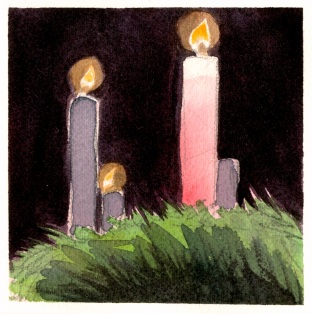“O Adonai”: O Sacred Lord of the House of Israel,
giver of the Law to Moses on Sinai:
come to rescue us with your mighty power!
 The “O Antiphons” are titles to be associated with the Messiah, the Anointed One; on 18 December, the Messiah is linked to the Lord of Israel who saved Israel. The connection continues through the allusion to Moses, called to lead the people to freedom in God’s name, and to whom God would give the Torah on Sinai. Although in English we tend to interpret “law” in a sense of “rules”, that is not the way it is understood in Hebrew and the Jewish tradition. Torah refers to instruction or teaching. In the covenant relationship with God, these instructions describe the practical nature of how the covenant is to be lived.
The “O Antiphons” are titles to be associated with the Messiah, the Anointed One; on 18 December, the Messiah is linked to the Lord of Israel who saved Israel. The connection continues through the allusion to Moses, called to lead the people to freedom in God’s name, and to whom God would give the Torah on Sinai. Although in English we tend to interpret “law” in a sense of “rules”, that is not the way it is understood in Hebrew and the Jewish tradition. Torah refers to instruction or teaching. In the covenant relationship with God, these instructions describe the practical nature of how the covenant is to be lived.
 God’s part of the covenant is to rescue us. When Pope Francis promulgated Misericordiae Vultus announcing the Extraordinary Year of Mercy, he chose to evoke this scene of the all-powerful God with Moses:
God’s part of the covenant is to rescue us. When Pope Francis promulgated Misericordiae Vultus announcing the Extraordinary Year of Mercy, he chose to evoke this scene of the all-powerful God with Moses:
1. Jesus Christ is the face of the Father’s mercy. These words might well sum up the mystery of the Christian faith. Mercy has become living and visible in Jesus of Nazareth, reaching its culmination in him. The Father, “rich in mercy” (Eph 2:4), after having revealed his name to Moses as “a God merciful and gracious, slow to anger, and abounding in steadfast love and faithfulness” (Ex34:6), has never ceased to show, in various ways throughout history, his divine nature. . . . Whoever sees Jesus sees the Father (cf. Jn 14:9). Jesus of Nazareth, by his words, his actions, and his entire person reveals the mercy of God.

Our relationship with God is not about law enforcement but about faithfulness and compassion in the relationship. Pope Francis (Evangelii Gaudium #44) reminds pastors and others who serve in ministry that, “without detracting from the evangelical ideal, they need to accompany with mercy and patience the eventual stages of personal growth as these progressively occur.”
I want to remind priests that the confessional must not be a torture chamber but rather an encounter with the Lord’s mercy which spurs us on to do our best. A small step, in the midst of great human limitations, can be more pleasing to God than a life which appears outwardly in order but moves through the day without confronting great difficulties.
 The Church, the pope reminds his readers, is always open because God is always open to all. “The Church is called to be the house of the Father, with doors always wide open” (#47). In addressing the pastoral consequences of this radical openness, the pope tackles a current issue head on:
The Church, the pope reminds his readers, is always open because God is always open to all. “The Church is called to be the house of the Father, with doors always wide open” (#47). In addressing the pastoral consequences of this radical openness, the pope tackles a current issue head on:
The Eucharist, although it is the fullness of sacramental life, is not a prize for the perfect but a powerful medicine and nourishment for the weak. These convictions have pastoral consequences that we are called to consider with prudence and boldness. Frequently, we act as arbiters of grace rather than its facilitators. But the Church is not a tollhouse; it is the house of the Father, where there is a place for everyone, with all their problems.
The pope concludes the chapter by recalling his frequent exhortation that he prefers “a Church which is bruised, hurting and dirty because it has been out on the streets, rather than a Church which is unhealthy from being confined and from clinging to its own security. I do not want a Church concerned with being at the center and which then ends by being caught up in a web of obsessions and procedures.” In his opening of the Holy Door at Saint Peter’s, he challenged us all to be mindful of the Spirit of the Second Vatican Council, the Spirit of the Samaritan.
The God of Israel, Adonai, is the God of all.
ADVENT REFLECTION
In serving others, do we accept the challenge to be missionary, to be constantly reaching out to others rather than sitting in our churches waiting for people to come to us? Do we act as “arbiters of grace” or “facilitators of grace”? Are we guilty of treating the Eucharist as a “prize for the perfect” or do we understand Eucharist as Adonai reaching out to all in mercy? Adonai, the Lord God of Israel, comes to set us all free, and we who serve in any way, are challenged to be instruments of that freedom.

I have noticed you don’t monetize your blog, don’t waste your traffic, you can earn additional cash
every month because you’ve got hi quality content.
If you want to know how to make extra bucks, search for: best adsense alternative Wrastain’s tools